Building Beyond Barriers: A Woman’s Journey in Civil Construction
CategoriesOur People
By Laurasha Govender, Pr.Tech.Eng | Principal Construction Management Pavement Engineering & Construction (PEC) at Naidu Consulting
Opening Reflections:
I’m Laurasha Govender, a Professional Civil Engineering Technologist and Principal Construction Management Pavement Engineering & Construction at Naidu Consulting (Pty) Ltd, where I lead multi-disciplinary teams across major infrastructure projects in Southern Africa.
My core competencies include pavement engineering, road rehabilitation, stormwater and sewer systems, and construction leadership. I’m driven by a commitment to strengthening leadership standards in construction, ensuring that teams deliver with accountability, technical excellence, and strategic alignment.
Being a woman in the field of civil engineering and construction signifies more than a professional designation, it embodies a strategic and purposeful role within a sector where female representation remains limited. It entails challenging traditional perceptions, enhancing visibility, and expanding access to leadership opportunities for future generations.
I share my professional journey to underscore that aspiring women engineers have a rightful and vital role, not only in project planning and design offices but also on-site, leading multidisciplinary teams, managing complex multimillion-rand infrastructure projects, and contributing decisively to the development and maintenance of our transportation networks and civil infrastructure.
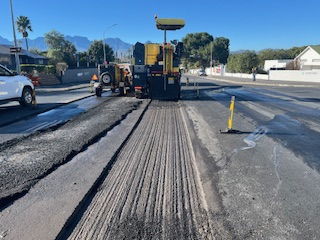
Early Aspirations: A Simple Curiosity Became a Career – My Entry into Industry
Early in my career, I was employed as part of the contractor’s team on various construction sites, where I quickly developed an appreciation for the unpredictable and dynamic nature of construction. Working on-site offered me invaluable hands-on experience, allowing me to engage directly with the complexities of infrastructure development, from managing earthworks to coordinating multidisciplinary teams under challenging conditions.
Understanding the crucial role, Civil Engineering plays in shaping sustainable, functional communities through infrastructure such as roads, stormwater systems, and transport networks. We facilitate economic growth, improve access, and enhance quality of life. Being part of this process, seeing tangible progress daily was both professionally rewarding and personally motivating. It led me to appreciate how what we do actually connects communities.
While I was often one of the few women forming part of the on-site teams, I was fortunate to benefit from mentors who recognized my potential. Their guidance helped me to build confidence, develop technical expertise, and step into leadership roles with clarity and purpose. This foundation has been vital in my continued growth and commitment to advancing infrastructure development in Industry.
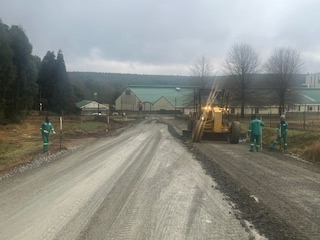
Site Boots and Steep Learning Curves – The On-site Realities
My early career saw me working as a Civil Technician and Site Agent, immersed in major bulk earthworks and urban infrastructure projects across both the public and private sectors. This exposure provided a comprehensive understanding of the multifaceted nature of construction from designing and implementing stormwater drainage systems to managing asphalt pavement construction.
My responsibilities extended beyond technical execution to encompass contract administration under a variety of procurement frameworks, including GCC, FIDIC, COLTO, and COTO contracts. Navigating these complex contract environments demanded not only technical knowledge but also strong organizational and communication skills to ensure compliance, mitigate risks, and resolve disputes effectively.
Working on-site presented unique challenges, particularly as one of the few women in a male-dominated environment. At times, my presence was met with scepticism, and I quickly realized that biases and preconceived notions could only be overcome through demonstrated expertise. In such settings, knowing your work thoroughly, backing yourself with confidence, and consistently delivering quality results were the only ways to earn genuine respect and authority.
The physical and social demands of site management required resilience. From negotiating with contractors to managing high-pressure situations, I learned that technical competence was not simply an advantage, it was essential. This foundation of knowledge and performance became my most effective tool in breaking down barriers and establishing credibility, allowing me to lead effectively and influence project outcomes despite prevailing industry biases.
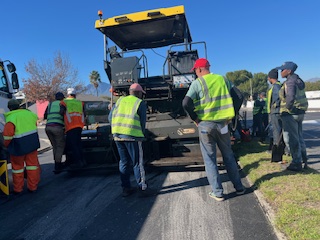
The Barriers We Still Face as Women in Construction
Let’s be honest: construction is still a male-dominated field. Being a woman in this space often means:
- Navigating unconscious (and conscious) bias
- Having to prove your technical credibility repeatedly
- Balancing societal expectations while leading high-stakes projects
- Dealing with site environments not designed with women in mind from PPE to ablution facilities
These aren’t minor hurdles. However, I’ve learned the more confidence I build through competence, the louder my voice becomes.
Milestones That Matter
Today, I have the privilege of leading a multidisciplinary team of over 80 engineers and technical professionals within Naidu Consulting’s Pavement and Construction Division. Together, we have successfully delivered some of South Africa’s most significant infrastructure projects, which play a vital role in enhancing regional connectivity and economic development. Notable projects under my leadership include:
- SANRAL Route Upgrades –Multi billion, flagship projects critical to national transport efficiency.
- City of Cape Town Resurfacing – multiple contracts supporting urban mobility and commuter safety
- Extensive projects with the KwaZulu-Natal and Eastern Cape Department of Transport – including multiple Main Roads, aimed at upgrading vital transport corridors
My role encompasses the full project lifecycle, from initial budget formulation and strategic planning to contractor supervision, claims evaluation, and ensuring delivery within scope, time, and budget constraints. This holistic involvement ensures alignment between technical execution and broader stakeholder objectives.
Beyond the technical and managerial aspects, one of the most meaningful aspects of my work is mentoring emerging contractors and the next generation of engineers, particularly women. I am committed to empowering these professionals to build confidence, develop their leadership capabilities, and take ownership of their careers. Cultivating this pipeline of talent is essential not only for the growth of our industry but also for driving a more inclusive, innovative, and resilient infrastructure sector.
Women still make up less than 15% of the engineering and construction workforce in South Africa. With even fewer leadership positions on-site. Although, we are noticing positive changes
- Government and private sector initiatives are pushing for inclusion
- Organisations like SAWIC, SAICE, and CBE are creating more support structures
- And most importantly, more women are stepping in, standing tall, and steering boldly
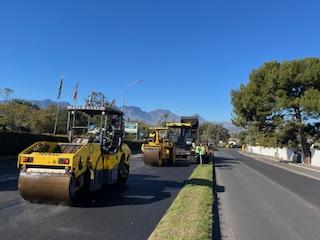
A Call to Aspiring Women and Industry leaders in Engineering & Construction
Through my journey, I’ve come to understand that success in this field is not about fitting into outdated norms, but about showing up with purpose, competence, and conviction. Here are a few guiding principles I share with those entering the profession:
- Don’t wait for permission – show up and take your place. Be proactive in seeking opportunities, even in spaces where representation is still evolving.
- Pursue professional registration early (e.g., ECSA Pr.Tech.Eng, Pr.Eng or SACPMP). It establishes your credibility and sets a solid foundation for advancement.
- Commit to continuous professional development whether it’s mastering contract frameworks like FIDIC and GCC, project management methodologies, or expanding your technical expertise.
- Find mentors and allies who support your growth but equally, commit to mentoring others. Shared knowledge strengthens the entire profession.
- Use your voice. Even in moments of uncertainty, speaking up creates space for others to do the same.
- You don’t need to be perfect. What matters is being present, prepared, and persistent.
Building a more inclusive and representative construction industry is not the sole responsibility of women, it is a leadership obligation that calls for commitment across the board.
True leadership is reflected in the environments we create and the opportunities we enable. Inclusion is not simply about meeting a quota; it’s about recognizing talent, rewarding merit, and ensuring that all professionals are given the space to lead and grow.
Here’s how we can all contribute to a more equitable and high-performing industry:
- Create psychologically safe, supportive work environments, particularly on-site where inclusion is often lacking.
- Assess performance based on capability and contribution, not on outdated assumptions or unconscious biases.
- Be an intentional mentor or sponsor. Champion emerging professionals not only those who reflect your own background or path.
Throughout my career, I’ve been fortunate to work with leaders who embodied these principles. Their belief in my potential made a meaningful difference and today, I consider it my responsibility to pay that forward by investing in the growth of others and remaining committed to excellence.
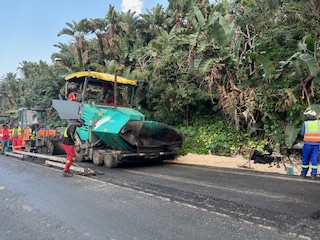
A Vision for the Future of Construction
My vision is of a construction industry where diversity is embedded into the fabric of our profession, where representation is not exceptional, but expected. An industry where women engineers are recognised not as pioneers breaking barriers, but as peers contributing equally to innovation, technical leadership, and strategic directions.
Beyond boardrooms and construction sites, this vision extends to our communities. I want to see young girls in rural and underserved areas aspiring to careers in engineering and construction not limited by geography or circumstances, but empowered by access, visibility and opportunity. This is not only a social imperative, but a strategic one. A diverse and inclusive construction industry is more innovative, more responsive to community needs and more equipped to deliver the complex infrastructure solutions required for further development.
Closing Thoughts
The construction and engineering industries are evolving and with that evolution comes responsibility to shape the environments where diverse talent is not only welcomed but empowered. As a woman in civil engineering and construction leadership, I have experienced both the challenges and the opportunities that come with occupying underrepresented spaces. I have also seen firsthand how excellence, resilience and mentorship can pave the way for meaningful change.
We are not just constructing roads and bridges; we are constructing opportunity.


Leave a Comments